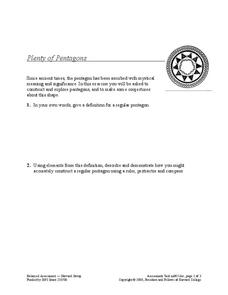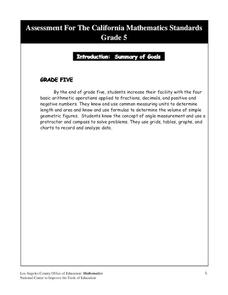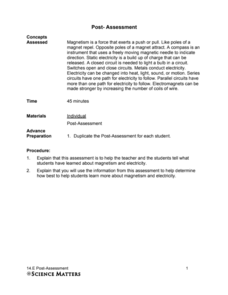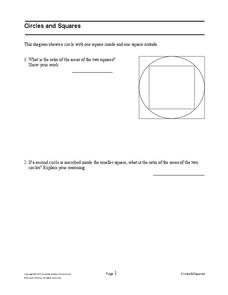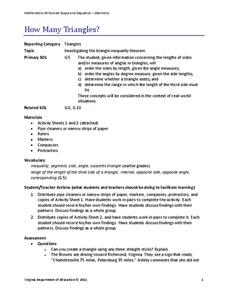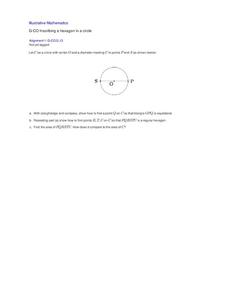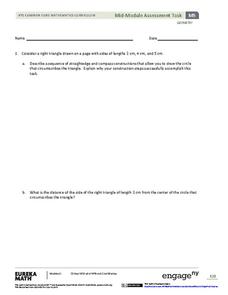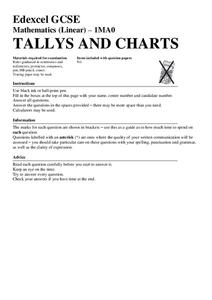Balanced Assessment
Plenty of Pentagons
Why are only four colors needed to color webs from regular pentagons, not five? An assessment task requires young mathematicians to first construct regular pentagons using a compass and straightedge, then has them consider a shape...
Science Matters
Electricity and Magnetism Formative Assessment #2
Leave it to science to get scholars out of a jam. Young scientists use what they've learned about electricity and magnetism in the previous eight lessons in the series to build tools that will allow them to find their way out of the...
EngageNY
Positive and Negative Numbers on the Number Line—Opposite Direction and Value
Make your own number line ... using a compass. The first installment of a 21-part series has scholars investigate positive and negative integers on a number line by using a compass to construct points that are the same distance from zero...
Los Angeles County Office of Education
Assessment for the California Mathematics Standards Grade 5
Test young mathematicians' knowledge with an assessment aligned to California's fifth grade state standards. The exam covers a multitude of concepts including fractions and decimals, positive and negative numbers, measurement; and...
Curated OER
T Points from Directions
Here is a lesson that starts with having geometers translate points using compass directions into an accurate picture of the problem. Then they must use their knowledge of the Pythagorean theorem or similar triangles to solve. This makes...
Mathed Up!
Loci and Constructions
A General Certificate of Secondary Education math review has class members make basic constructions. Using a protractor and a ruler along with a compass, pupils develop drawings of triangles with given measurements. Scholars use their...
Science Matters
Electricity and Magnetism Formative Assessment #1
A formative assessment is a great tool for planning further instruction. The fifth lesson of a 14-part series exploring magnetism and electricity provides questions to gauge current understanding of magnetic fields, compasses, and...
Science Matters
Post Assessment: Magnetism and Electricity
Time to know what they know! The final installment of a 14-lesson unit assesses the class's understanding of magnetism and electricity concepts. Items include both multiple-choice and open-ended questions on magnetic fields, electric...
Mathematics Assessment Project
Circles and Squares
Squares, and circles ... and squares, and more circles. In this high school assessment task, pupils investigate the ratio of areas of two squares that are circumscribed and inscribed in a circle. They then determine the ratio of the area...
Mathed Up!
Bearings
Keep the math straight and true. Using information learned about angle relationships, pupils determine drawn bearings, or draw a line with a given bearing. The accompanying video provides the definition of a bearing and its three...
Curated OER
North Or Northern?
In this direction words worksheet, learners complete a ten question multiple choice on-line interactive quiz about the correct use of direction words such as north, northern, east, eastern.
Mathed Up!
2D and 3D Shapes
What a great assessment to give young mathematicians in order to test their knowledge on two- and three-dimensional shapes. Learners name various shapes, identify the number of edges, faces, and vertices, match an unfolded version of a...
EngageNY
Properties of Dilations
Investigate dilations to learn more about them. The second segment in a series of 16 provides a discussion of properties of dilations by going through examples. The problem set provides opportunities for scholars to construct dilations.
Curated OER
Reflected Triangles
Your learners find and construct the line of reflection between a triangle's pre-image and its reflection image in this short activity.
Virginia Department of Education
How Many Triangles?
Something for young mathematicians to remember: the sum of any two sides must be greater than the third. Class members investigates the Triangle Inequality Theorem to find the relationship between the sides of a triangle. At the...
Curated OER
Inscribing a Hexagon in a Circle
This activity is a follow-on activity to inscribing a square in a circle. The overall problem is more complex. It deals with geometric constructions, properties of triangles, and regular hexagons. The final part of the activity...
EngageNY
Geometry Module 5: Mid-Module Assessment
How can you formally assess understanding of circle concepts? Pupils take a mid-module assessment containing five questions, each with multiple parts.
EngageNY
Mid-Module Assessment Task: Grade 8 Module 3
How well does the class understand dilations? The three-part assessment presents problems related to the properties of dilations. Pupils perform dilations and determine whether a dilation is responsible for a specific image.
EngageNY
Tangent Lines and the Tangent Function
Construct tangent lines and make the connection to tangent functions. An informative lesson reviews the geometry origins of the tangent function. Pupils use that information to determine how to construct a tangent to a circle from a...
Concord Consortium
Detective Stories
The truth will always come out. A short performance task has learners considering a witness statement given to a detective. They apply special line segments in triangles and Ceva's Theorem to prove that the witness is actually lying.
Curated OER
Inscribing a Square in a Circle
Inscribing a square in a circle brings up a number of interesting geometry topics including triangle congruence and how to prove a quadrilateral is a square. This activity is followed up by finding the area of the square and determining...
Mathed Up!
Tallys and Charts
After watching a brief instructional video, young mathematicians are put to the test. By completing and reading frequency tables, tally charts, and bar graphs, individuals show their understanding of how to interpret data.
Mathed Up!
Place Value
Prompt class members to find the value of various digits, and to write numbers in standard form and written form. Pupils also round multi-digit numbers to the nearest hundred and thousand.
Mathed Up!
Ordering Numbers
Young mathematicians order numbers from least to greatest. Number types include whole numbers, decimals, and negative numbers.
Other popular searches
- Compass Rose
- Compass Skills
- Compass Skills Worksheets
- Compass Rose Worksheet
- Compassion
- Compass Rose Art Lessons
- Compass Skills 3rd Grade
- Compass Skills First Grade
- Compass Course
- Compass Skills Elementary
- Compass Rose Lesson Plans
- Compass Directions
